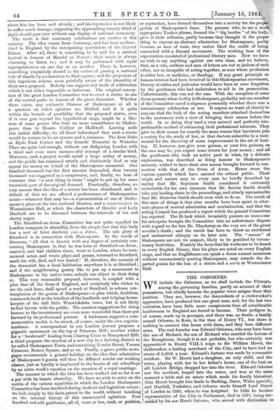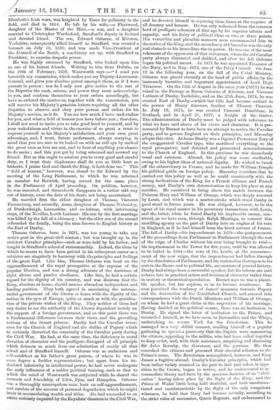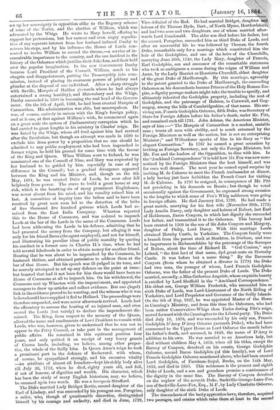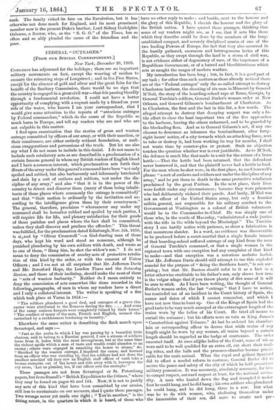THE OSBORNES.
WE include the Osbornes, as we shall include the Fitzroysr among the governing families, partly on account of their possessions, but chiefly because the popular voice assigns them that position. They are, however, the descendants of a clothworker's apprentice, have produced but one great man, and, for the last two- centuries, have been little more conspicuous than all considerable landowners in England are forced to become. Their pedigree is,. of course, made up in peerages, and there was, no doubt, a family named Osborne, in Kent, in the time of Henry VI., but there is. nothing to connect this house with them, and they bore different arms. The real founder was Edward Osborne, who may have been the son of Richard, the son of Richard who married the heiress of the Broughtons, though it is not probable, but who certainly was apprenticed in Henry VITI.'s reign to Sir William Hewit, the clothworker, a leading merchant of the City, said to have had an estate of 6,0001. a year. Edward's fortune was made by a romantic incident. Sir W. Hewit had a daughter, an only child, and the nurse, playing with her in her father's house, one of the best on old London Bridge, dropped her into the river. Edward Osborne saw the accident, leaped into the water, and won at the same moment a bride and an estate which made his family historical. Miss Hewit brought him lands in Barking, Essex, Wales (parish), and Harthill, Yorkshire, and Osborne made himself Lord Mayor of London in 1582, when he was knighted. In 1585 he became representative of the City in Parliament, died in 1591, being suc- ceeded by his son Hewit Osborne, who served with distinction in
Elizabeth's Irish wars, was knighted by Essex for gallantry in the field, and died in 1614. He left by his wife,—a Fleetwood, daughter of the Master of the Mint,—a son, and a daughter married to Christopher Wardesford, Strafford's deputy in Ireland and devoted friend. The son, Edward Osborne, of Kiveton, Yorkshire, consequently allied himself to Strafford, was created a baronet on July 13, 1620, and was made Vice-President of the Council of the North, a machinery set up, with Strafford as President, to exercise despotic power.
He was highly esteemed by Strafford, who looked upon him as one of his fastest friends. Writing to him from Dublin, on the 10th of February, 1639, Wentworth says :—" I send you herewith my commission, which makes you my Deputy-Lieutenant- General, and gives you absolute power amongst them, as if I were present in person; nor do I only now give notice to the rest of the Deputies the rank, esteem, and power they must acknowledge in you, and conform themselves to your orders accordingly, but have so ordered the matter as, together with the commigsion, you will receive his Majesty's gracious letters requiring all the other Deputies to observe and obey your person and orders for his Majesty's service, as is fit. You see how much I have undertaken for you, and what a field of honour you have before you ; therefore, I shall not need to incite you to take good heed to yourself, and by your wakefulness and virtue in the exercise of so great a trust to express yourself to his Majesty's satisfaction and your own great advantage, and, I trust, future preferment, always carrying in mind that you are sure to be looked on with an evil eye by such of the great ones as love me not, and to hear of anything you chance to do amiss ; and this you get by being esteemed and avowed my friend. But as this ought to awaken you to every good and careful duty, so I trust their displeasure shall do you as little hurt as hitherto, I praise God and thank the King, it hath done me." This " field of honour," however, was closed to Sir Edward by the meeting of the Long Parliament, to which he was returned as member for Berwick, having served for the same place in the Parliament of April preceding. On petition, however, he was unseated, and thenceforth disappears in a rather odd way out of history, even the date of his death not being ascertained.
He married first the eldest daughter of Thomas, Viscount Fauconberg, and secondly, Anne, daughter of Thomas Walmisley, of Dunkenhaigh, Lancashire, and co-heiress, with intervening steps, of the Nevilles, Lords Latimer. His son by the first marriage was killed by the fall of a chimney ; but the elder son of the second refounded the family, being the man known to English history as the Earl of Danby.
Thomas Osborne, born in 1631, was too young to take any active part in the great civil contest ; but was brought up in the strictest Cavalier principles—such as were held by his father, and taught in Strafford's school of statesmanship. Indeed, the ideas by which he seems to have been guided in his subsequent career as a minister are singularly in harmony with the principles and feelings of the great Earl. Like him, Thomas Osborne was bent on the aggrandizement of the royal prerogative at the expense of the popular liberties, and was a strong advocate of the doctrines of right divine and passive obedience. Like him, he had a certain regard for the dignity of his country, and was desirous that the King, absolute at home, should assume abroad an independent and leading position. They both agreed in associating the untram- meled government of the Crown at home with the dignity of the nation in the eyes of Europe, quite as much as with the gratifica- tion of the private wishes of the King. They neither of them had any desire to see the authority of the Crown dependent merely on the support of a foreign government, and on this point there was a fundamental difference between their views and the grovelling notions of the- Stuart princes. Danby had the Cavalier rever- ence for the Church of England and the dislike of Popery which so seriously disturbed the unanimity of the Cavalier party during the Civil War. He had, at the same time, the deficiency in moral elevation of character and the profligate disregard of all principle which detracts so much from our admiration of nearly all that school and of Strafford himself. Osborne was as audacious and self-confident as his father's great patron, of whom he was in some degree a feebler representative ; but apart from his un- doubted inferiority in intellectual power, he had never undergone the early influences of a nobler political training, such as that to which the mind of Wentworth was subjected while he shared the counsels and friendship of Eliot, Pym, and Hampden. Osborne was a thoroughly unscrupulous man, bent on self-aggrandizement, and careless of the amount of personal degradation which he might incur in accumulating wealth and titles. - He had succeeded to an estate seriously impaired by the Royalists' disasters in the Civil War, and he devoted himself to repairing these losses at the expense of all decency and honour. He was only redeemed from the common herd of profligate schemers of that age by his superior talents and sagacity, and his fixity of political ideas on two or three points. His versatility and plausible manners soon recommended him to the notice of the King, and the ascendancy of Clarendon was the only real obstacle to his immediate rise to power. He was one of the most vehement of the opponents of that statesman, whom the old Cavalier party always distrusted and disliked, and after his fall Osborne began his political ascent. In 1671 he was appointed Treasurer of the Navy, and in May, 1672, one of the Privy Council. On June 19 in the following year, on the fall of the Cabal Ministry, Osborne was placed virtually at the head of public affairs by the immensely lucrative and important appointment of Lord High Treasurer. On the 15th of August in the same year (1673) he was raised to the Peerage as Baron Osborne of Kiveton, and Viscount Latimer of Danby, Yorkshire, and on the 27th June, 1674, he was created Earl of Danby—which last title had become extinct in the person of Henry Danvers, brother of Eleanor Danvers. In July 19, 1675, he was created Viscount Dumblane, in Scotland, and in April 21, 1677, a Knight of the Garter. The administration of Danby must be judged with reference to what we have said above of his views and character. It is pro- nounced by Burnet to have been an attempt to revive the Cavalier party, and to govern England on their principles, and Macaulay adopts this view. At home Danby was a bigoted Protestant Tory of the exaggerated Cavalier type, who sacrificed everything to the royal prerogative, and detested and persecuted nonconformists to the Church of England. In this province he was shamelessly venal and covetous. Abroad, his policy was more creditable, owing to his higher ideas of national dignity. He wished to break off the subserviency to France, and he made Sir William Temple his political guide on foreign policy. Macaulay considers that he carried out this policy as well as he could consistently with the strong inclinations of the King for a French alliance and French money, and Danby's own determination to keep his place at any sacrifice. He contrived to bring about the match between the Princess Mary and William of Orange, which was deeply resented by Louis, and which was a master-stroke which stood Danby in good stead in future years. He was obliged, however, to be the agent of his royal master in his pecuniary transactions with Louis, and the latter, when he found Danby his implacable enemy, con- trived, as we have seen, through Ralph Montagu, to convert this unwilling agency on the part of Danby into an engine of his ruin in England, as if he had himself been the hired servant of France. The fall of Danby—his impeachment in 1678—the postponement of the proceedings from Parliament to Parliament through the rest of the reign of Charles without his ever being brought to trial— his imprisonment in the Tower for five years, until he was allowed to be bailed in 1684—the vote of the Lords, at the commence- ment of the new reign, that the impeachment had fallen through by the dissolution of Parliament, and his restoration thereupon to his seat in the House and to political life, are matters of general history. Danby had always been a successful speaker, but his talents are said to have lain in practical action and decision of character rather than in oratory or theoretical speculation. Burnet says he was a plausi- ble speaker, but too copious, so as to become wearisome. He soon perceived the tendency of James' measures towards Popery and the destruction of the Established Church, and entered into correspondence with the Dutch Ministers and William of Orange, on whom he had a great claim as the negotiator of his marriage. Having decided on his political course, there was no hesitation in Danby. He signed the letter of invitation to the Prince, and reconciled himself, as we have seen, to Devonshire and the Whigs, undertaking to secure York for the Revolution. This he managed in a very skilful manner, availing himself of a popular gathering to spread a panic-cry that the Papists were massacring the citizens, appealing to the militia, who had been called together to keep order, and, with their assistance, surprising and disarming Sir John Reresby, the Governor, and the garrison. He then convoked the citizens and procured their cheerful adhesion to the Prince's cause. The Revolution accomplished, however, and King James a fugitive abroad, Danby's Cavalier principles, which had been rather rudely strained in the part he had just taken in oppo- sition to the Crown, began to revive, and he endeavoured to ac commodate theory and facts by the specious doctrine of an " abdi- cation " having taken place by the flight of the King; and the Prince of Wales' birth being held doubtful, and both unsubstan- tiated and unsubstantiable by the flight of the only competent witnesses, he held that Mary had become actually, according to the strict rules of succession, Queen Regnant, and endeavoured to
set up her sovereignty in opposition alike to the Regency scheme of some of the Tories, and the election of William, which was advocated by the Whigs. Ile wrote to Mary herself, offering to support her pretensions, but her earnest and even angry repudia- tion of any separate interest from her husband induced Danby to retrace his steps, and by his influence the House of Lords con- sented to invite William to ascend the throne,—a service of in- conceivable importance to the country, and the one incident in the history of the Osbornes which justifies their dukedom, and their hold over the popular imagination. In the new Government Danby became Lord President of the Council, William, much to his chagrin and disappointment, putting the Treasuryship into com- mission, instead of placing its enormous powers of jobbery and plunder at the disposal of one individual. After a sharp struggle with Saville, Marquis of Halifax (towards whom he had always entertained a strong hostility), and Shrewsbury and the Whigs, Danby succeeded in 1690 in becoming the real head of the Govern- ment. On the 9th of April, 1689, he had been created Marquis of Carmarthen. His administration was able, but unscrupulous. He was, of course, entirely in unison with the King's foreign policy, and at home, at first against William's wish, he commenced again on a great scale the system of Parliamentary corruption which he had carried to great lengths in his ministry in Charles' reign. He was hated by the Whigs, whose old feud against him had revived after the Revolution, but though an attempt was made in 1690 to exclude him from power by a proposition that no one should be admitted to any public employment who had been impeached in former reigns, he held his ground for some time with the favour of the King and Queen. When William went to Ireland, he was nominated one of the Council of Nine, and Mary was requested by her husband to be guided by him, especially in case of any difference in the Council ; but a gradual divergence appeared between the King and his Minister, and, though on the 4th May, 1694, he was created Duke of Leeds, he soon after fell helplessly from power. The crave to build a great house at any risk, which is the besetting sin of many prominent Englishmen, was never absent from his mind, and his venality ruined him at last. A committee of inquiry into the bribes said to have been received by great men soon led to the detection of the bribe of five thousand five hundred guineas which Leeds had re- ceived from the East India Company. Wharton reported this to the House of Commons, and was ordered to impeach Leeds at the bar of the Lords in the name of the Commons. Leeds had been addressing the Lords in his defence, admitting that he had procured the money from the Company, but alleging it was only for his friend Bates (the agent employed), and not for himself, and illustrating his peculiar ideas of public morality by quoting his conduct in a former case in Charles IL's time, when he had told several falsehoods in order to obtain money for another friend. Hearing that he was about to be impeached by the Commons, he hastened thither, and obtained permission to address them at the bar of that House. But his speech was ill-judged in its tone, and he scarcely attempted to set up any defence on the point at issue; but boasted that had it not been for him there would have been no House of Commons at all to impeach him. On his withdrawal, the Commons sent up Wharton with the impeachment, and appointed managers to draw up articles and collect evidence. But one (legal) link in the evidence proved to be wanting, and the witness who it was believedcould have supplied it fled to Holland. The proceedings were therefore suspended, and were never afterwards revived. Leeds had the effrontery to assume the bearing of an injured man, and even moved the Lords (but vainly) to declare the impeachment dis- missed. The King, from respect to the memory of the Queen, allowed the name and emoluments of Lord President to remain with Leeds, who was, however, given to understand that he was not to appear in the Privy Council, or take part in the management of public affairs. He remained in this equivocal position four years, and only quitted it on receipt of very heavy grants of Crown lands, including, we believe, among other proper- ties, the whole of the Scilly Isles. In Queen Anne's reign he took a prominent part in the defence of Sacheverel, with whom, of course, he sympathized strongly, and his excessive vitality —;an attribute of almost all founders—kept his sickly body alive till July 26, 1712, when he died, eighty years old, and full, if not of honour, of dignities and wealth. His character, which has been the study of many English historians, may, we believe, be summed up in two words. He was a bourgeois Strafford. The puke married Lady Bridget Bertie, second daughter of the .
Earl of Lindsey, and was succeeded by his youngest son, Peregrine, a sailor, who, though of questionable discretion, distinguished himself by his courage and audacity, and died in June, 1729, Vice-Admiral of the Red. He had married Bridget, daughter heiress of Sir Thomas Hyde, Bart., of North Myms, Elertfordrahirei and had two sons and two daughters, one of whom married after- wards Lord Dundonald. The elder son died before his father, but the second, Peregrine, succeeded him as third Duke of Leeds, and after an uneventful life he was followed by Thomas, the fourth Duke, remarkable only for a marriage which constituted him the heir of the Godolphins, and one of the heirs of the Churchills, marrying June 26th, 1740, the Lady Mary, daughter of Francis, Earl Godolphin, son and successor of the remarkable statesman who took so ambiguous a course during the reigns of William and Anne, by the Lady Harriet or Henrietta Churchill, eldest daughter of the great Duke of Marlborough. By this marriage, agreeably to the patent granted to the Duke of Marlborough, the succeeding Osbornes as his descendants became Princes of the Holy Roman Em- pire, a dignity peerage-makers might take the trouble to specify, and ultimately inherited the Godolphin property, including the seat of Godolphin, and the patronage of Hasten, in Cornwall, and Gog- magog, among the hills of Cambridgeshire, of that name. His sur- viving son, Francis Godolphin Osborne, fifth Duke, was Secretary of State for Foreign Affairs before his father's death, under Mr. Pitt, and remained such 011791. John Adams, the American Minister, says of him The Marquis of Carmarthen is a modest, amiable man ; treats all men with civility, and is much esteemed by the Foreign Ministers as well as the nation, but is not an enterprising Minister;" and Wilberforce speaks of him in his diary as "the elegant Carmarthen." In 1787 he caused a great sensation by inviting as Foreign Secretary, not only the Foreign Ministers, but Mr. Fox and the leaders of the Opposition, to dine with him. In the "Auckland Correspondence" it is told how Mr. Fox was now more noticed by the Foreign Ministers than the host himself, and was for once well dressed. The next year he caused equal surprise by inviting M. de Calonne to meet the French Ambassador at dinner, a lady having just been forbidden the French Court for visiting M. de Calonne. In 1791 he resigned, in consequence of Mr. Pitt not persisting in his demands on Russia ; but though he voted occasionally against the Government, he expressed strong aversion to the lengths to which some of Fox's Whig noblemen were going in foreign affairs. He died January 31st, 1799. He had made a great match, marrying for his first wife (November 29th, 1773)
Lady Amelia Darcy, only daughter and heiress of Robert, last Earl of Holderness, Baron Conyers, in which last dignity she succeeded
her father, and transmitted it to the Osbornes. This barony had been created in 1509 in the son of Sir John Conyers and Margery, daughter of Philip, Lord Darcy. With this marriage Leeds obtained Hornby Castle, in Yorkshire. The Conyers family were a branch from the parent stock at Stockton, in Durham, and rose to importance in Richmondshire by the patronage of the Scroopes of Bolton, about the time of Richard H. " Gul-Coniers," says Leland, " the first lord of that name, dyd great coste on Horneby Castle. It was before but a mene thing." By the Baroness Conyers (from whom he obtained a divorce in 1779) the Duke had two sons, the younger of whom, Lord Francis Godolphin Osborne, was the father of the present Duke of Leeds. The Duke married, secondly, a Miss Catherine Anguish, whose exquisite beauty is extolled by Lord Sheffield in the " Auckland Correspondence." His eldest son, George William Frederick, who succeeded him as sixth Duke of Leeds, was Lord-Lieutenant of the North Riding of Yorkshire, and Lord Proprietor and Governor of the Scilly Islands. On the 4th of May, 1827, he was appointed Master of the Horse in Canning's Ministry, and from this time the Osborne; who had been rather Conservative-Whigs than Tories during Pitt's reign, moved forwardwith the Canningites to the Liberal party. The Duke died July 10, 1838, and was succeeded by his only son, Francis Godolphin D'Arcy D'Arcy Osborne (seventh Duke), who had been summoned to the Upper House as Lord Osborne the month before his father's death, and assumed, in 1849, the name of D'Arcy in addition to his own. He was married to an American lady, but died without children May 4, 1859, when all his titles, except the Barony of Conyers, devolved on his cousin, George Godolphin Osborne, second Baron GodOlphin (of this family), son of Lord Francis Godolphin Osborne mentioned above, who bad been created Lord Godolphin, of Farnham-Royal, Bucks, on the 14th May, 1832, and died in 1850. This nobleman is the present and eighth Duke of Leeds, and a son and grandson promise a continuance of the dignity in the same line. The Barony of Conyers devolved on the nephew of the seventh Duke, Sackville-George-Lane-Fox, son of Sackville-Lane-Fox, Esq., M.P., by Lady Charlotte Osborne, only daughter of the sixth Duke of Leeds.
The descendants of the lucky apprentice have, therefore, acquired two peerages, and estates which raise them at least to the second rank. The family risked its fate on the Revolution, but it has otherwise not done much for England, and its most prominent member now is the present Duke's brother, Lord Sidney Godolphin Osborne, a Rector, who, as the " S. G. O." of the Times, has so often and so ably pleaded the cause of the friendless and the poor.

































 Previous page
Previous page